Tina Turner is ‘simply the best’ for raising awareness for the link between untreated high blood pressure and kidney failure during her lifetime.
“I can’t remember ever getting an explanation about what high blood pressure means or how it affects the body,” Tina Turner said in an article for Show Your Kidneys Love, an international campaign for kidney health.
“My kidneys are victims of my elevated blood pressure” -Tina Turner
She was on dialysis after having a kidney transplant years ago due to untreated hypertension. Untreated hypertension can cause blood vessels to narrow, decreasing blood flow to the kidneys. Without proper blood flow, the kidneys cannot remove excess fluid and waste from the body — and as that fluid builds up, blood pressure will only increase further. Chronic kidney disease may cause arms, legs, and face swelling. It’s a dangerous cycle that can lead to kidney failure, but intervening early is possible.
“I considered high blood pressure my normal,” Tina Turner is quoted on Show Your Kidneys Love’s website. “Hence, I didn’t really try to control it. In 1985 a doctor gave me a prescription for pills of which I was supposed to take one a day, and that was it. I didn’t give it any more thought. After suffering a stroke in 2009 because of my poorly controlled hypertension I struggled to get back up on my feet. This is when I first learned that my kidneys didn’t work that well anymore. They had already lost thirty-five percent of their function. I tried to learn more about these organs’ function and meaning. Most people probably don’t even know where their kidneys are located and what they are for until their health is at stake.”
Mismanaged high blood pressure is the second leading cause of kidney failure in the US.
Memorial Day Weekend is an excellent time to inform people of the link between alcohol and high blood pressure. Drinks with friends can be the best part of a three-day weekend, but when, what, and how much you drink matters.
Research shows drinking too much alcohol can raise blood pressure to unhealthy levels. Having more than three drinks in one sitting temporarily raises blood pressure. Repeated binge drinking can lead to long-term increases in blood pressure.
What is Moderate Drinking?
Moderate drinking means having no more than one drink daily for women and no more than two drinks for men.
One can argue that Tina Turner frequently admitted she didn’t smoke or drink alcohol. But she admitted that after being diagnosed with high blood pressure in 1978, she thought of it as her “normal” and didn’t attempt to control it.
“I put myself at great danger by refusing to accept the reality that I required daily medication for the rest of my life,” she wrote on Instagram on March 9.
“Show your kidneys love. They deserve it.”
We’re discussing kidney disease and diabetes on this Divabetic podcast with musical inspiration from P.M. Dawn.
Prince Be, the psychedelic pop-rap group P.M. Dawn’s frontman, suffered various health problems from mismanaged type 2 diabetes. He had several strokes, including one in 2005 that left him partly paralyzed, and gangrene, which led to the partial amputation of one leg. He died of renal failure resulting from complications of diabetes at age 46.
Renal failure (often called kidney failure) is when the kidneys stop working and cannot remove waste and extra water from the blood or keep body chemicals in balance. Acute or severe renal failure happens suddenly (for example, after an injury) and may be treated and cured. Chronic renal failure develops over many years, may be caused by conditions like high blood pressure or diabetes, and cannot be cured. Chronic renal failure may lead to dialysis (cleaning the blood by passing it through a membrane or filter) or a kidney transplant.
Podcast Guests: Poet Lorraine Brooks, Mama Rose Marie, Lynette Luckers from the Marion Luckers Kidney Foundation, Chef Robert Lewis aka The Happy Diabetic, Janis Roszler, RD, CDCES, FAND and Luther Vandross Superfan, and Historian Leon Petrossian.
Tina Turner believed most people don’t know their kidneys are located; this video proves they don’t know where their pancreas is either! Your pancreas produces insulin. Insulin lowers blood sugar levels in your body.



